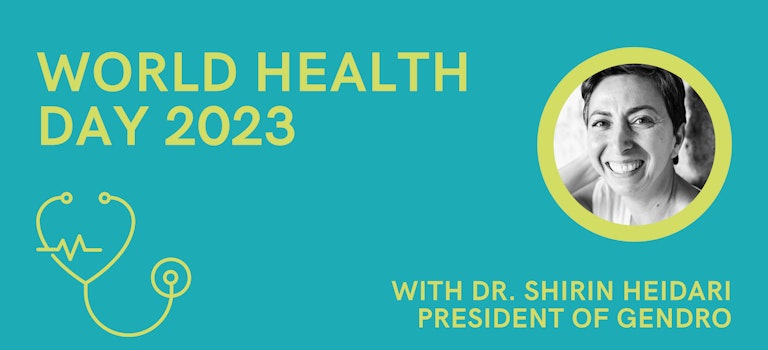Ahead of World Health Day 2023 on 7 April, the International Gender Champions Secretariat sat down with gender and global health expert, Dr. Shirin Heidari. As founder and president of GENDRO, she works to advancing sex and gender equity in research. Dr. Heidari is Senior Research Fellow at the Global Health Centre at the Geneva Graduate Institute and a Senior Technical Consultant on Gender to the World Health Organization.
This year’s theme for World Health Day is “Health for All". How can global health systems have gender and sex biases?
Health institutions and health systems are not isolated entities, but a part of larger society and mirror societal biases, patriarchal gender norms and are in some settings still stained by history of colonialism. However, there is a growing awareness of these biases, and many efforts are being made to transform the systems, institutions and bring about a change that can enable the vision of Health For All in a more meaningful way.
What are the consequences of these biases for women's and girls' lived realities?
Sadly, these historical biases have been to the detriment of women and girls’ health and well-being, and the disadvantages are even greatly felt by women and girls with intersecting identities, such as women of colour, migrant and refugee women, women and girls (individuals) of diverse sexual orientation and gender identity, and so on. Women have been historically under-represented in health research, their needs and challenges rarely considered in health policies and delivery of health interventions and their voices unheard in decision making processes. Medicines and health interventions are often ignorant of the specificities related to women. Examples include poor recognition of symptoms in women which may differ from that of men, overlooking sex-differences in drug metabolism or not capturing the differential side effects of drugs or vaccines, not to mention gender-related barriers to health services, such as related to the availability of services for women, affordability, provider attitudes, and the disproportionate burden of care and domestic responsibilities which both have a direct and indirect health impact.
What is the role International Geneva can play in addressing gender-related discrimination in healthcare service delivery and health governance?
Geneva is the capital of global health, with numerous organizations working on improving the health and wellbeing of people, leaving no one behind. It is critical that in all our organizations, in all our capacities, we are mindful of how gender permeates every aspect of our life, and how we need to apply that intersectional gender lens in our everyday work. Most importantly, we must ensure that the evidence we produce reflects the realities of all genders. Only by identifying where disparities lie, and understanding the underlying mechanisms that perpetuate health inequities, can we realize our ambition for all to enjoy the highest attainable standards of health.
Finally, what advice to you have for International Gender Champions and other leaders in the international sphere to truly realize “Health for All”?
International Gender Champions have brought about a real change in making pledges that are nowadays a norm – for example, there is a level of embarrassment these days to organize or take part in a panel consisting of only men, which I would attribute to the great campaigns by IGC. I would very much like to see a pledge by the IGC that any reports or documents that include data and that are produced by Gender Champions’ organizations include disaggregated data and articulate gender-related concerns and implications.
For more information about GENDRO, visit https://www.gendro.org/.
